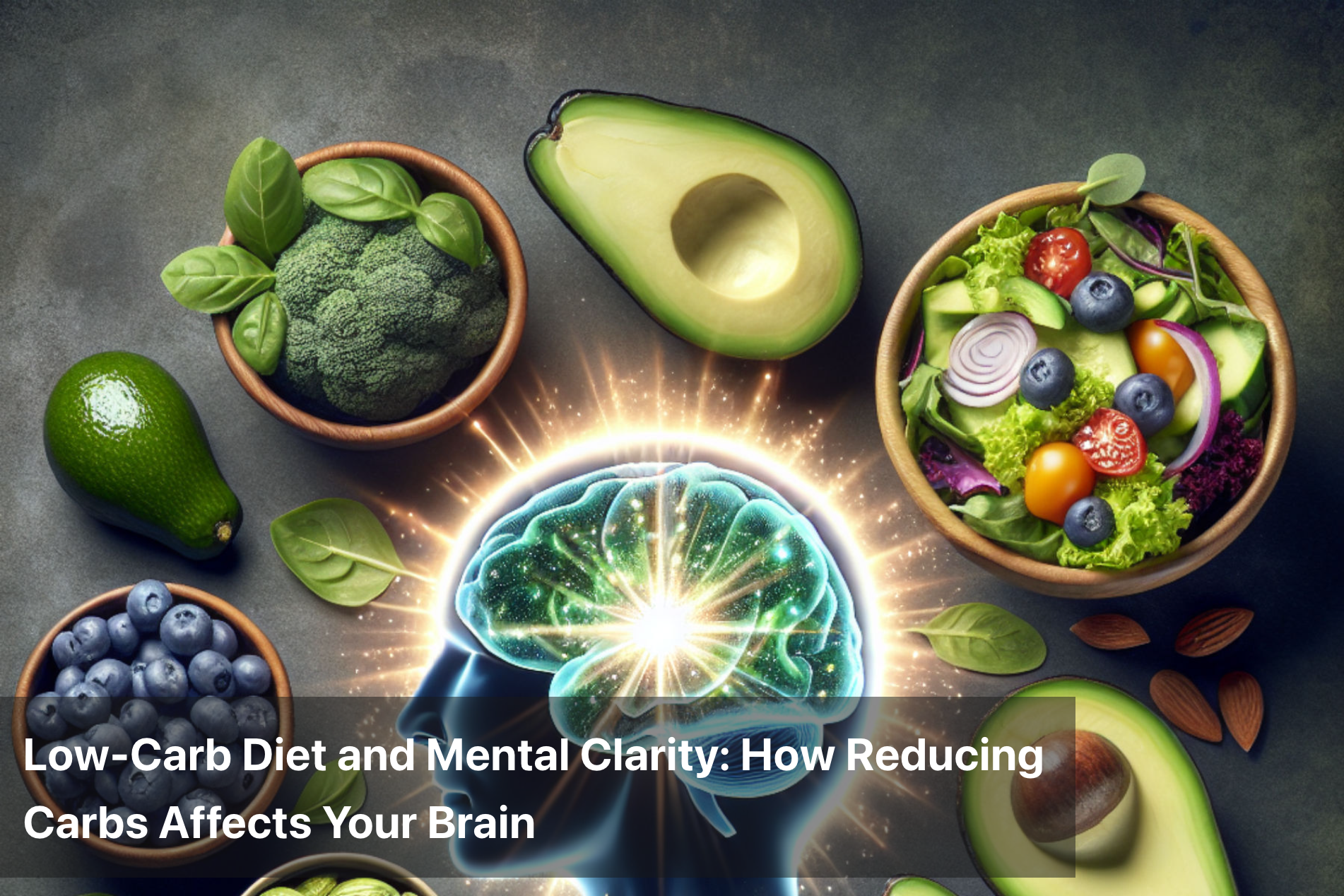
Low-Carb Diet and Mental Clarity: How Reducing Carbs Affects Your Brain
Low-carb diets have long been recognized for their ability to promote weight loss, stabilize blood sugar, and improve metabolic health. But one area that is gaining more attention is how cutting down on carbohydrates can influence mental clarity and overall brain function. Many people report experiencing better focus, reduced brain fog, and enhanced cognitive performance after transitioning to a low-carb or ketogenic diet. But what’s really going on in the brain when carbs are restricted?
Understanding the relationship between nutrition and brain function begins with recognizing how carbohydrates influence the central nervous system and how shifting to fat as the primary fuel source may benefit mental performance.

The Brain and Its Energy Needs
The brain is one of the most energy-demanding organs in the body, using about 20% of the body's total energy. Glucose, derived from carbohydrates, is typically the brain's primary source of fuel. However, during periods of low carbohydrate intake, the body begins to convert fat into ketones—an alternative fuel source that the brain can use efficiently.
Ketones are produced in the liver from fatty acids and have been shown to cross the blood-brain barrier easily, providing a stable and consistent source of energy. This metabolic shift is often associated with improvements in cognitive performance and mental clarity.
How Low-Carb Diets Enhance Mental Clarity
-
Stable Blood Sugar Levels
Frequent spikes and crashes in blood sugar from high-carb meals can lead to energy fluctuations, irritability, and difficulty concentrating. Low-carb diets help regulate blood sugar and insulin levels, reducing these energy dips and promoting sustained mental focus. -
Increased Production of Ketones
Ketones are not only a cleaner energy source but also have neuroprotective properties. They may reduce inflammation in the brain, enhance mitochondrial function, and improve neuronal signaling—factors that can enhance cognitive performance. -
Reduced Brain Fog
Brain fog, a common complaint among individuals with high-carb diets or insulin resistance, often improves with carb reduction. This may be due to reduced inflammation and improved insulin sensitivity. -
Enhanced Neurotransmitter Balance
Low-carb diets may support the balance of neurotransmitters such as GABA and glutamate, promoting better mood regulation and decreased anxiety.
Common Causes of Mental Fatigue Related to Diet
|
Cause |
How It Affects Mental Performance |
|---|---|
|
High sugar intake |
Leads to blood sugar crashes and brain fog |
|
Nutrient deficiencies |
Low levels of B vitamins, omega-3s, or magnesium affect brain health |
|
Chronic inflammation |
Interferes with neurotransmitter production and function |
|
Insulin resistance |
Reduces glucose availability to the brain |
|
Poor hydration |
Dehydration can impair memory, attention, and focus |
Symptoms of Poor Cognitive Function Due to Diet
-
Difficulty concentrating or staying focused
-
Short-term memory lapses
-
Feeling mentally "foggy" or slow
-
Fatigue even after adequate rest
-
Mood swings and irritability
-
Headaches or lightheadedness
Precautions When Starting a Low-Carb Diet for Mental Clarity
Transitioning to a low-carb lifestyle can bring initial challenges. As the body adapts to using fat instead of carbohydrates for fuel, some people experience temporary symptoms collectively known as the “keto flu.” These may include headaches, fatigue, irritability, and mental fog—ironically, the very symptoms one aims to eliminate.
To minimize these effects, consider the following precautions:
-
Stay hydrated: Dehydration can worsen brain fog and fatigue. Drink water and include electrolytes such as sodium, potassium, and magnesium.
-
Gradually reduce carbs: Instead of cutting carbs drastically overnight, reduce intake slowly to allow the body to adapt.
-
Eat nutrient-dense foods: Ensure you're getting enough vitamins and minerals to support brain health.
-
Include healthy fats: Avocados, nuts, seeds, olive oil, and fatty fish provide essential fatty acids needed for optimal brain function.
-
Monitor mental and emotional changes: If symptoms persist or worsen, consult a healthcare provider to rule out underlying issues.
Tips for Maximizing Mental Clarity on a Low-Carb Diet
-
Prioritize Sleep: Sleep is crucial for memory consolidation and mental performance. Low-carb diets often improve sleep quality, but initial disturbances may occur as the body adjusts.
-
Practice Mindful Eating: Avoid processed low-carb foods and focus on whole, nutrient-rich options to support long-term mental health.
-
Incorporate Brain-Boosting Supplements: Omega-3 fatty acids, MCT oil, magnesium, and adaptogens like ashwagandha can complement the benefits of a low-carb diet.
-
Exercise Regularly: Physical activity increases blood flow to the brain and supports mental performance. It also helps your body utilize fat for fuel more efficiently.
-
Stay Consistent: Mental clarity improvements may not be immediate. Consistency with the diet and lifestyle changes is key to long-term benefits.
Low-Carb Brain-Friendly Foods to Include
|
Food |
Benefits |
|---|---|
|
Eggs |
High in choline, supports memory |
|
Salmon |
Rich in omega-3s, reduces inflammation |
|
Leafy greens |
Packed with antioxidants and magnesium |
|
Avocados |
Healthy fats and potassium for neural support |
|
Berries |
Low in carbs and high in polyphenols |
|
Nuts & seeds |
Provide essential nutrients and brain-friendly fats |

Who Should Be Cautious with Low-Carb Diets?
While many people benefit from reduced carb intake, certain groups should consult with healthcare professionals before starting:
-
Pregnant or breastfeeding women
-
Individuals with a history of eating disorders
-
Those on diabetes medications or insulin
-
People with thyroid imbalances
-
Individuals with neurological conditions requiring specialized diets
Summary
Reducing carbohydrates in the diet can have a profound impact not just on the body, but also on the brain. A well-formulated low-carb diet promotes stable energy, reduces inflammation, and enhances neurotransmitter function—all of which contribute to improved mental clarity and cognitive performance. However, it's essential to approach the transition mindfully, ensuring the body receives adequate nutrients and support during the adaptation phase.
For those seeking a sharper mind and a more focused life, embracing a low-carb lifestyle—when done properly—can be a powerful step toward mental and physical well-being. At Lofoods, we believe that what you eat should not only nourish your body but also empower your mind.
This Blog post is an initiative by Lo! Foods, to provide accurate and Nutritionist / Doctor approved information related to Health. Lo! Foods is India's leading brand for Everyday Functional Foods. Foods designed for specific Health conditions or Needs. Lo! Foods also runs India's largest range of Low Carb Healthy Cloud Kitchens, under the brand names of Lo!, ProteinChef, ATH (All Things Healthy) and DiabeSmart.













Leave a comment
Your email address will not be published.